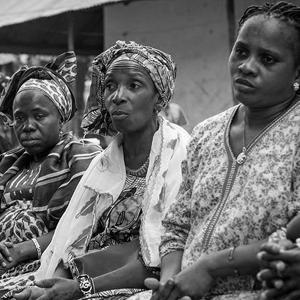Story Highlights
- Majorities in most countries say it is possible to have a woman leader in 10 years
- Men preferred over women as managers
- Many believe women should be given scholarships
- Many believe movements such as #MeToo are helping women
Fitting with the U.N.'s theme for International Women's Day this year -- women in leadership -- Gallup looks at the never-before-released results on a series of questions that we asked on this topic in 2019 and early 2020.
Gallup asked women and men in 74 countries questions in four areas that are key to starting conversations in an action-driven way: women's leadership in politics and in the workplace, their opportunities for education, and whether movements such as #MeToo help to reduce harassment and sexual abuse of women.
Majorities in Most Countries Think a Woman Could Lead Them in the Next 10 Years
Women have been present in various levels of political leadership for years in Africa, but former Liberian President Ellen Johnson Sirleaf's election as the first female head of state in 2006 opened the door for others who have occupied the top leadership posts since. Africa currently has just one female president and three female prime ministers, but majorities across most of the 21 countries surveyed in 2019 say it is possible that a woman could lead their country in the next 10 years.
| Possible | Not possible | Woman already leads my country* | |||||||||||||||||||||||||||||||||||||||||||||||||||||||||||||||||||||||||||||||||||||||||||||||||
|---|---|---|---|---|---|---|---|---|---|---|---|---|---|---|---|---|---|---|---|---|---|---|---|---|---|---|---|---|---|---|---|---|---|---|---|---|---|---|---|---|---|---|---|---|---|---|---|---|---|---|---|---|---|---|---|---|---|---|---|---|---|---|---|---|---|---|---|---|---|---|---|---|---|---|---|---|---|---|---|---|---|---|---|---|---|---|---|---|---|---|---|---|---|---|---|---|---|---|---|
| % | % | % | |||||||||||||||||||||||||||||||||||||||||||||||||||||||||||||||||||||||||||||||||||||||||||||||||
| Mauritius** | 87 | 11 | -- | ||||||||||||||||||||||||||||||||||||||||||||||||||||||||||||||||||||||||||||||||||||||||||||||||
| Rwanda** | 83 | 13 | -- | ||||||||||||||||||||||||||||||||||||||||||||||||||||||||||||||||||||||||||||||||||||||||||||||||
| Mozambique** | 75 | 17 | 1 | ||||||||||||||||||||||||||||||||||||||||||||||||||||||||||||||||||||||||||||||||||||||||||||||||
| Botswana | 73 | 21 | 1 | ||||||||||||||||||||||||||||||||||||||||||||||||||||||||||||||||||||||||||||||||||||||||||||||||
| Ivory Coast | 69 | 25 | 1 | ||||||||||||||||||||||||||||||||||||||||||||||||||||||||||||||||||||||||||||||||||||||||||||||||
| Senegal** | 67 | 28 | 1 | ||||||||||||||||||||||||||||||||||||||||||||||||||||||||||||||||||||||||||||||||||||||||||||||||
| Lesotho | 66 | 30 | -- | ||||||||||||||||||||||||||||||||||||||||||||||||||||||||||||||||||||||||||||||||||||||||||||||||
| Togo** | 66 | 27 | -- | ||||||||||||||||||||||||||||||||||||||||||||||||||||||||||||||||||||||||||||||||||||||||||||||||
| Benin | 65 | 31 | -- | ||||||||||||||||||||||||||||||||||||||||||||||||||||||||||||||||||||||||||||||||||||||||||||||||
| Gabon** | 65 | 29 | -- | ||||||||||||||||||||||||||||||||||||||||||||||||||||||||||||||||||||||||||||||||||||||||||||||||
| Guinea | 60 | 30 | -- | ||||||||||||||||||||||||||||||||||||||||||||||||||||||||||||||||||||||||||||||||||||||||||||||||
| Burkina Faso | 59 | 30 | 1 | ||||||||||||||||||||||||||||||||||||||||||||||||||||||||||||||||||||||||||||||||||||||||||||||||
| Mali** | 58 | 38 | -- | ||||||||||||||||||||||||||||||||||||||||||||||||||||||||||||||||||||||||||||||||||||||||||||||||
| Republic of Congo | 56 | 40 | -- | ||||||||||||||||||||||||||||||||||||||||||||||||||||||||||||||||||||||||||||||||||||||||||||||||
| Chad | 53 | 36 | 1 | ||||||||||||||||||||||||||||||||||||||||||||||||||||||||||||||||||||||||||||||||||||||||||||||||
| Cameroon | 52 | 41 | -- | ||||||||||||||||||||||||||||||||||||||||||||||||||||||||||||||||||||||||||||||||||||||||||||||||
| Comoros | 52 | 39 | 2 | ||||||||||||||||||||||||||||||||||||||||||||||||||||||||||||||||||||||||||||||||||||||||||||||||
| Madagascar | 47 | 44 | 1 | ||||||||||||||||||||||||||||||||||||||||||||||||||||||||||||||||||||||||||||||||||||||||||||||||
| Niger | 46 | 41 | -- | ||||||||||||||||||||||||||||||||||||||||||||||||||||||||||||||||||||||||||||||||||||||||||||||||
| Zimbabwe | 42 | 45 | -- | ||||||||||||||||||||||||||||||||||||||||||||||||||||||||||||||||||||||||||||||||||||||||||||||||
| Mauritania | 27 | 55 | 1 | ||||||||||||||||||||||||||||||||||||||||||||||||||||||||||||||||||||||||||||||||||||||||||||||||
| ** Have had a female prime minister or president at one time *Volunteered response | |||||||||||||||||||||||||||||||||||||||||||||||||||||||||||||||||||||||||||||||||||||||||||||||||||
| Gallup World Poll, 2019 | |||||||||||||||||||||||||||||||||||||||||||||||||||||||||||||||||||||||||||||||||||||||||||||||||||
In Madagascar, Niger and Zimbabwe residents are evenly divided as to whether it is possible for a woman to become the leader of their country in the next 10 years. Mauritania is the only country surveyed where a majority (55%) says it is not possible for a woman to be their country's leader. Such attitudes in Mauritania may reflect the relatively low representation that women have in the country's national politics. However, the 2014 election featured the country's second-ever female candidate.
With a few exceptions, most men and women believe it is possible for a woman to lead their country someday soon, but women in many countries are more confident than men in this possibility. A median of 65% of women across the 21 countries surveyed say it is possible for this to happen in the next 10 years, compared with a median of 57% of men.
Male Managers Preferred Over Female Managers
While the numbers of women in management positions in Africa have improved in some countries in recent years, women in many countries (where data are available) still largely remain underrepresented in middle and senior management. Based on residents' attitudes as to their preference for a manager -- a man or a woman -- this dynamic is unlikely to change anytime soon.
Across the 21 countries surveyed, a median of 47% say that if they could choose to have a man or a woman as a manager, they would prefer a man. A median of 34% would prefer a woman. Men as managers are preferred in all except four countries. While residents in Lesotho, Chad and Togo are more divided, people in Mauritius are the only ones to prefer a woman to a man as a manager.
| Woman | Man | No preference | |||||||||||||||||||||||||||||||||||||||||||||||||||||||||||||||||||||||||||||||||||||||||||||||||
|---|---|---|---|---|---|---|---|---|---|---|---|---|---|---|---|---|---|---|---|---|---|---|---|---|---|---|---|---|---|---|---|---|---|---|---|---|---|---|---|---|---|---|---|---|---|---|---|---|---|---|---|---|---|---|---|---|---|---|---|---|---|---|---|---|---|---|---|---|---|---|---|---|---|---|---|---|---|---|---|---|---|---|---|---|---|---|---|---|---|---|---|---|---|---|---|---|---|---|---|
| % | % | % | |||||||||||||||||||||||||||||||||||||||||||||||||||||||||||||||||||||||||||||||||||||||||||||||||
| Lesotho | 48 | 46 | 5 | ||||||||||||||||||||||||||||||||||||||||||||||||||||||||||||||||||||||||||||||||||||||||||||||||
| Benin | 45 | 41 | 12 | ||||||||||||||||||||||||||||||||||||||||||||||||||||||||||||||||||||||||||||||||||||||||||||||||
| Mauritius | 43 | 35 | 18 | ||||||||||||||||||||||||||||||||||||||||||||||||||||||||||||||||||||||||||||||||||||||||||||||||
| Madagascar | 43 | 50 | 6 | ||||||||||||||||||||||||||||||||||||||||||||||||||||||||||||||||||||||||||||||||||||||||||||||||
| Chad | 42 | 43 | 13 | ||||||||||||||||||||||||||||||||||||||||||||||||||||||||||||||||||||||||||||||||||||||||||||||||
| Togo | 40 | 40 | 18 | ||||||||||||||||||||||||||||||||||||||||||||||||||||||||||||||||||||||||||||||||||||||||||||||||
| Mozambique | 40 | 47 | 9 | ||||||||||||||||||||||||||||||||||||||||||||||||||||||||||||||||||||||||||||||||||||||||||||||||
| Zimbabwe | 39 | 44 | 15 | ||||||||||||||||||||||||||||||||||||||||||||||||||||||||||||||||||||||||||||||||||||||||||||||||
| Senegal | 37 | 43 | 19 | ||||||||||||||||||||||||||||||||||||||||||||||||||||||||||||||||||||||||||||||||||||||||||||||||
| Guinea | 37 | 49 | 13 | ||||||||||||||||||||||||||||||||||||||||||||||||||||||||||||||||||||||||||||||||||||||||||||||||
| Niger | 34 | 53 | 11 | ||||||||||||||||||||||||||||||||||||||||||||||||||||||||||||||||||||||||||||||||||||||||||||||||
| Mali | 31 | 54 | 14 | ||||||||||||||||||||||||||||||||||||||||||||||||||||||||||||||||||||||||||||||||||||||||||||||||
| Ivory Coast | 31 | 56 | 11 | ||||||||||||||||||||||||||||||||||||||||||||||||||||||||||||||||||||||||||||||||||||||||||||||||
| Republic of Congo | 30 | 58 | 10 | ||||||||||||||||||||||||||||||||||||||||||||||||||||||||||||||||||||||||||||||||||||||||||||||||
| Burkina Faso | 30 | 44 | 23 | ||||||||||||||||||||||||||||||||||||||||||||||||||||||||||||||||||||||||||||||||||||||||||||||||
| Botswana | 30 | 38 | 28 | ||||||||||||||||||||||||||||||||||||||||||||||||||||||||||||||||||||||||||||||||||||||||||||||||
| Rwanda | 28 | 56 | 11 | ||||||||||||||||||||||||||||||||||||||||||||||||||||||||||||||||||||||||||||||||||||||||||||||||
| Mauritania | 27 | 42 | 24 | ||||||||||||||||||||||||||||||||||||||||||||||||||||||||||||||||||||||||||||||||||||||||||||||||
| Gabon | 27 | 49 | 21 | ||||||||||||||||||||||||||||||||||||||||||||||||||||||||||||||||||||||||||||||||||||||||||||||||
| Comoros | 26 | 68 | 5 | ||||||||||||||||||||||||||||||||||||||||||||||||||||||||||||||||||||||||||||||||||||||||||||||||
| Cameroon | 24 | 58 | 16 | ||||||||||||||||||||||||||||||||||||||||||||||||||||||||||||||||||||||||||||||||||||||||||||||||
| Gallup World Poll, 2019 | |||||||||||||||||||||||||||||||||||||||||||||||||||||||||||||||||||||||||||||||||||||||||||||||||||
Men in the region decidedly prefer a male manager to a female manager if given the choice: a median of 56% say that they prefer a man as their boss. Women, on the other hand, are more divided, with a median of 43% saying they would prefer a woman and 39% preferring a male manager. In six of the countries, including Benin, Madagascar, Niger, Chad, Lesotho and Mauritius, a majority of women say they would prefer a female boss.
More Believe Women Should Get College Scholarships
Although millions of young people have swelled the ranks of colleges and universities across sub-Saharan Africa over the past few decades, the percentage of the population enrolled in tertiary education still remains far lower than elsewhere around the world. And within that population, females continue to be underrepresented: For every 100 males enrolled in tertiary education in 2013, 72 females were enrolled.
With gender parity in higher education slowly improving in sub-Saharan Africa, people may realize how female education disproportionately improves social welfare. Across the 21 countries surveyed, a median of 46% say if a similarly qualified woman and man were competing for a single scholarship to a university, the scholarship should go to the woman. A median of 38% say it should go to the man.
| Woman | Man | No preference | |||||||||||||||||||||||||||||||||||||||||||||||||||||||||||||||||||||||||||||||||||||||||||||||||
|---|---|---|---|---|---|---|---|---|---|---|---|---|---|---|---|---|---|---|---|---|---|---|---|---|---|---|---|---|---|---|---|---|---|---|---|---|---|---|---|---|---|---|---|---|---|---|---|---|---|---|---|---|---|---|---|---|---|---|---|---|---|---|---|---|---|---|---|---|---|---|---|---|---|---|---|---|---|---|---|---|---|---|---|---|---|---|---|---|---|---|---|---|---|---|---|---|---|---|---|
| % | % | % | |||||||||||||||||||||||||||||||||||||||||||||||||||||||||||||||||||||||||||||||||||||||||||||||||
| Togo | 54 | 32 | 11 | ||||||||||||||||||||||||||||||||||||||||||||||||||||||||||||||||||||||||||||||||||||||||||||||||
| Senegal | 53 | 32 | 14 | ||||||||||||||||||||||||||||||||||||||||||||||||||||||||||||||||||||||||||||||||||||||||||||||||
| Madagascar | 52 | 39 | 6 | ||||||||||||||||||||||||||||||||||||||||||||||||||||||||||||||||||||||||||||||||||||||||||||||||
| Zimbabwe | 52 | 28 | 19 | ||||||||||||||||||||||||||||||||||||||||||||||||||||||||||||||||||||||||||||||||||||||||||||||||
| Lesotho | 50 | 33 | 12 | ||||||||||||||||||||||||||||||||||||||||||||||||||||||||||||||||||||||||||||||||||||||||||||||||
| Chad | 50 | 33 | 14 | ||||||||||||||||||||||||||||||||||||||||||||||||||||||||||||||||||||||||||||||||||||||||||||||||
| Benin | 49 | 39 | 10 | ||||||||||||||||||||||||||||||||||||||||||||||||||||||||||||||||||||||||||||||||||||||||||||||||
| Guinea | 48 | 42 | 9 | ||||||||||||||||||||||||||||||||||||||||||||||||||||||||||||||||||||||||||||||||||||||||||||||||
| Rwanda | 47 | 38 | 12 | ||||||||||||||||||||||||||||||||||||||||||||||||||||||||||||||||||||||||||||||||||||||||||||||||
| Mauritius | 47 | 18 | 23 | ||||||||||||||||||||||||||||||||||||||||||||||||||||||||||||||||||||||||||||||||||||||||||||||||
| Mali | 46 | 46 | 7 | ||||||||||||||||||||||||||||||||||||||||||||||||||||||||||||||||||||||||||||||||||||||||||||||||
| Burkina Faso | 46 | 34 | 16 | ||||||||||||||||||||||||||||||||||||||||||||||||||||||||||||||||||||||||||||||||||||||||||||||||
| Mozambique | 45 | 43 | 10 | ||||||||||||||||||||||||||||||||||||||||||||||||||||||||||||||||||||||||||||||||||||||||||||||||
| Ivory Coast | 43 | 42 | 12 | ||||||||||||||||||||||||||||||||||||||||||||||||||||||||||||||||||||||||||||||||||||||||||||||||
| Republic of Congo | 36 | 54 | 8 | ||||||||||||||||||||||||||||||||||||||||||||||||||||||||||||||||||||||||||||||||||||||||||||||||
| Cameroon | 36 | 48 | 13 | ||||||||||||||||||||||||||||||||||||||||||||||||||||||||||||||||||||||||||||||||||||||||||||||||
| Comoros | 35 | 60 | 3 | ||||||||||||||||||||||||||||||||||||||||||||||||||||||||||||||||||||||||||||||||||||||||||||||||
| Gabon | 35 | 34 | 25 | ||||||||||||||||||||||||||||||||||||||||||||||||||||||||||||||||||||||||||||||||||||||||||||||||
| Botswana | 34 | 16 | 45 | ||||||||||||||||||||||||||||||||||||||||||||||||||||||||||||||||||||||||||||||||||||||||||||||||
| Niger | 31 | 58 | 9 | ||||||||||||||||||||||||||||||||||||||||||||||||||||||||||||||||||||||||||||||||||||||||||||||||
| Mauritania | 30 | 32 | 28 | ||||||||||||||||||||||||||||||||||||||||||||||||||||||||||||||||||||||||||||||||||||||||||||||||
| Gallup World Poll, 2019 | |||||||||||||||||||||||||||||||||||||||||||||||||||||||||||||||||||||||||||||||||||||||||||||||||||
Still, this attitude does not prevail everywhere. In four countries, Niger, Cameroon, the Republic of Congo and Comoros, people are more likely to say the scholarship should go to the man. In several others, including Mali, Mozambique, Mauritania, Gabon and Ivory Coast, populations are more divided as to who should get it.
Men and women across the region do not agree on who the recipient of the scholarships should be. Women are far more likely to believe this shot at higher education should go to the female, with a median of 52% saying a woman should get the scholarship versus 27% who say it should go to the man. Men are more likely to say that the man should get the scholarship, but they are more divided than women are: A median of 47% say the scholarship should go to the man, and 36% say it should go to the woman.
Movements Such as #MeToo Are More Likely Seen as Helping Women
The #MeToo movement that started in the U.S. may not have been as widespread in sub-Saharan Africa as it was in other parts of the world, but it has had an impact in a number of countries. For example, it reportedly motivated female university students in Kenya, Uganda, Nigeria and Sierra Leone to protest against sexual violence.
Still, in a region where speaking out against such experiences is taboo, residents are more likely to say that movements such as #MeToo have helped reduce harassment and sexual abuse of women in their countries. A median of 52% say such movements help, while 22% say they do not. However, a substantial percentage, 18%, say they have never heard of such movements.
| Yes | No | Never heard of it | |||||||||||||||||||||||||||||||||||||||||||||||||||||||||||||||||||||||||||||||||||||||||||||||||
|---|---|---|---|---|---|---|---|---|---|---|---|---|---|---|---|---|---|---|---|---|---|---|---|---|---|---|---|---|---|---|---|---|---|---|---|---|---|---|---|---|---|---|---|---|---|---|---|---|---|---|---|---|---|---|---|---|---|---|---|---|---|---|---|---|---|---|---|---|---|---|---|---|---|---|---|---|---|---|---|---|---|---|---|---|---|---|---|---|---|---|---|---|---|---|---|---|---|---|---|
| % | % | % | |||||||||||||||||||||||||||||||||||||||||||||||||||||||||||||||||||||||||||||||||||||||||||||||||
| Rwanda | 73 | 9 | 8 | ||||||||||||||||||||||||||||||||||||||||||||||||||||||||||||||||||||||||||||||||||||||||||||||||
| Zimbabwe | 61 | 10 | 22 | ||||||||||||||||||||||||||||||||||||||||||||||||||||||||||||||||||||||||||||||||||||||||||||||||
| Lesotho | 60 | 22 | 6 | ||||||||||||||||||||||||||||||||||||||||||||||||||||||||||||||||||||||||||||||||||||||||||||||||
| Mauritius | 59 | 17 | 10 | ||||||||||||||||||||||||||||||||||||||||||||||||||||||||||||||||||||||||||||||||||||||||||||||||
| Benin | 57 | 27 | 9 | ||||||||||||||||||||||||||||||||||||||||||||||||||||||||||||||||||||||||||||||||||||||||||||||||
| Mali | 56 | 21 | 20 | ||||||||||||||||||||||||||||||||||||||||||||||||||||||||||||||||||||||||||||||||||||||||||||||||
| Botswana | 55 | 17 | 18 | ||||||||||||||||||||||||||||||||||||||||||||||||||||||||||||||||||||||||||||||||||||||||||||||||
| Senegal | 55 | 9 | 30 | ||||||||||||||||||||||||||||||||||||||||||||||||||||||||||||||||||||||||||||||||||||||||||||||||
| Madagascar | 53 | 37 | 4 | ||||||||||||||||||||||||||||||||||||||||||||||||||||||||||||||||||||||||||||||||||||||||||||||||
| Mozambique | 53 | 23 | 16 | ||||||||||||||||||||||||||||||||||||||||||||||||||||||||||||||||||||||||||||||||||||||||||||||||
| Comoros | 52 | 32 | 8 | ||||||||||||||||||||||||||||||||||||||||||||||||||||||||||||||||||||||||||||||||||||||||||||||||
| Niger | 51 | 19 | 19 | ||||||||||||||||||||||||||||||||||||||||||||||||||||||||||||||||||||||||||||||||||||||||||||||||
| Guinea | 49 | 25 | 18 | ||||||||||||||||||||||||||||||||||||||||||||||||||||||||||||||||||||||||||||||||||||||||||||||||
| Ivory Coast | 45 | 24 | 12 | ||||||||||||||||||||||||||||||||||||||||||||||||||||||||||||||||||||||||||||||||||||||||||||||||
| Republic of Congo | 40 | 42 | 11 | ||||||||||||||||||||||||||||||||||||||||||||||||||||||||||||||||||||||||||||||||||||||||||||||||
| Burkina Faso | 38 | 25 | 25 | ||||||||||||||||||||||||||||||||||||||||||||||||||||||||||||||||||||||||||||||||||||||||||||||||
| Cameroon | 38 | 25 | 27 | ||||||||||||||||||||||||||||||||||||||||||||||||||||||||||||||||||||||||||||||||||||||||||||||||
| Togo | 37 | 22 | 26 | ||||||||||||||||||||||||||||||||||||||||||||||||||||||||||||||||||||||||||||||||||||||||||||||||
| Chad | 33 | 20 | 28 | ||||||||||||||||||||||||||||||||||||||||||||||||||||||||||||||||||||||||||||||||||||||||||||||||
| Gabon | 32 | 35 | 20 | ||||||||||||||||||||||||||||||||||||||||||||||||||||||||||||||||||||||||||||||||||||||||||||||||
| Mauritania | 28 | 16 | 36 | ||||||||||||||||||||||||||||||||||||||||||||||||||||||||||||||||||||||||||||||||||||||||||||||||
| Gallup World Poll, 2019 | |||||||||||||||||||||||||||||||||||||||||||||||||||||||||||||||||||||||||||||||||||||||||||||||||||
Women and men across the region are both more likely to see these movements as helpful than not. A median of 50% of women compared with 52% of men say that these movements help reduce harassment and sexual abuse of women in their countries.
Implications
These results provide an important baseline to measure Africans' mindsets on women's roles in the not-so-distant future. Harnessing Africans' readiness to have women in leadership positions, whether in politics or at work, is important to building equitable societies. And increasing access to quality education, especially at the university level, will be key to putting African women on their path to such leadership roles for generations to come.
Learn more about how the Gallup World Poll works.




